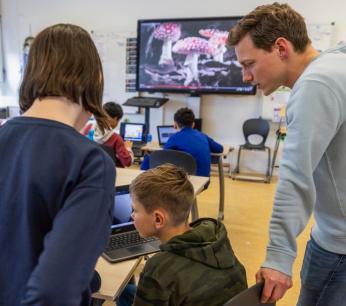Politics can no longer ignore specialized secondary education
However small secondary special education (VSO) may be, politically The Hague can no longer ignore it. After more than a year of fanatical lobbying by a group of enthusiastic teachers, a petition with more than 20 signatures will be handed over to the House of Representatives next Tuesday afternoon.

Image: VSOtoGVO
“Not only did we take visible action, but we also had a lot of contact with political parties behind the scenes. In addition to GroenLinks, SP and the PvdA, among others, D66 has also indicated that they want a solution for the VSO”, says Nanda van Hoek-Kreuger, biology teacher at the Axia College in Amersfoort and one of the initiators of such a study with fellow teachers. a year and a half ago set up an action group under the motto: from vso to gvo. The message in a nutshell: remove VSO from primary education (PO) and transfer it to secondary education (VO) under the heading of specialized secondary education.
Vso teachers fall under the collective labor agreement and earn less than their colleagues in secondary education. While they have more lesson-related hours. Then find good subject teachers in VSO, and see if they stick with them. It is not surprising that the number of unfilled vacancies, especially in the diploma-oriented part of the VSO, was a cause for concern in many schools. Last year a first step made available by structurally releasing 16,5 million euros (of the 76 million needed to reward VSO equally with secondary education).
Work pressure, recognition and regulations
The fact that the outgoing cabinet recently allocated 500 million euros to reduce the wage gap between primary and secondary education is of course also a boost for the VSO. “That is good news, especially if the next cabinet completely eliminates that difference. But it is a misunderstanding to think that this solves everything for the vso. We will then still fall under primary education, with all the laws and regulations that apply to this sector,” says Van Hoek-Kreuger. "For us, it is mainly about work pressure, recognition and appropriate regulations."
Because that's where the shoe pinches. For example, with the task policy: because of the collective labor agreement primary school teachers have significantly more lesson-related hours than their colleagues at regular secondary schools (940 versus 720) and they receive a much smaller surcharge for lesson preparation. Or take the competence requirements, where you can give professional lessons with a PABO diploma. “A PABO diploma is a fantastically beautiful diploma, but not for teaching five HAVO mathematics. If that happened in regular secondary education, it would be the fence of the dam”, says Van Hoek-Kreuger.
A pabo diploma is a fantastically beautiful diploma, but not for teaching five havo mathematics. If that happened in regular secondary education, the gate would be over
“It rubs off on many levels. In regular secondary education there is room for a technical education assistant (toa), who prepares practicals. We don't have any money for that. It goes up to the rules about the schoolyard. In primary school, students are not allowed to leave the schoolyard. But sixteen or seventeen-year-olds will of course go for a walk sometimes.”
Fortunately, part of the House of Representatives is taking the problems seriously. As with the exams, with a majority of political parties pushing for more time and space for students. But the precarious position of the VSO is also regularly discussed in debates.
AObdirector Thijs Roovers sees this as a big win. “VSO is a neglected child: they fall outside secondary education, while they belong there, and they also do not fit in primary education, which they officially fall under. But I can see that something has changed: there is more attention for the problems. VSO is on the map and that is partly thanks to the efforts of these teachers,” says Roovers.
On the agenda
Those teachers don't consider themselves rich at all. It remains to be seen how the 500 million will be distributed within the primary school and it remains exciting what will come out of the formation. But a year after the start of their online petition, it is a good time to hand over the statements of support. Admittedly, the petition initially aimed for XNUMX signatures. Then the signature campaign would also be given the status of a citizens' initiative, putting it on the agenda of the House of Representatives.
Van Hoek-Kreuger: “That would have been very exceptional, but we are too small a sector for that. It is wonderful that we are past twenty thousand. Fortunately, we are already on the agenda in The Hague.”
Sign the petition here. Also read: Cao primary education is a block to the leg of VSO schools


